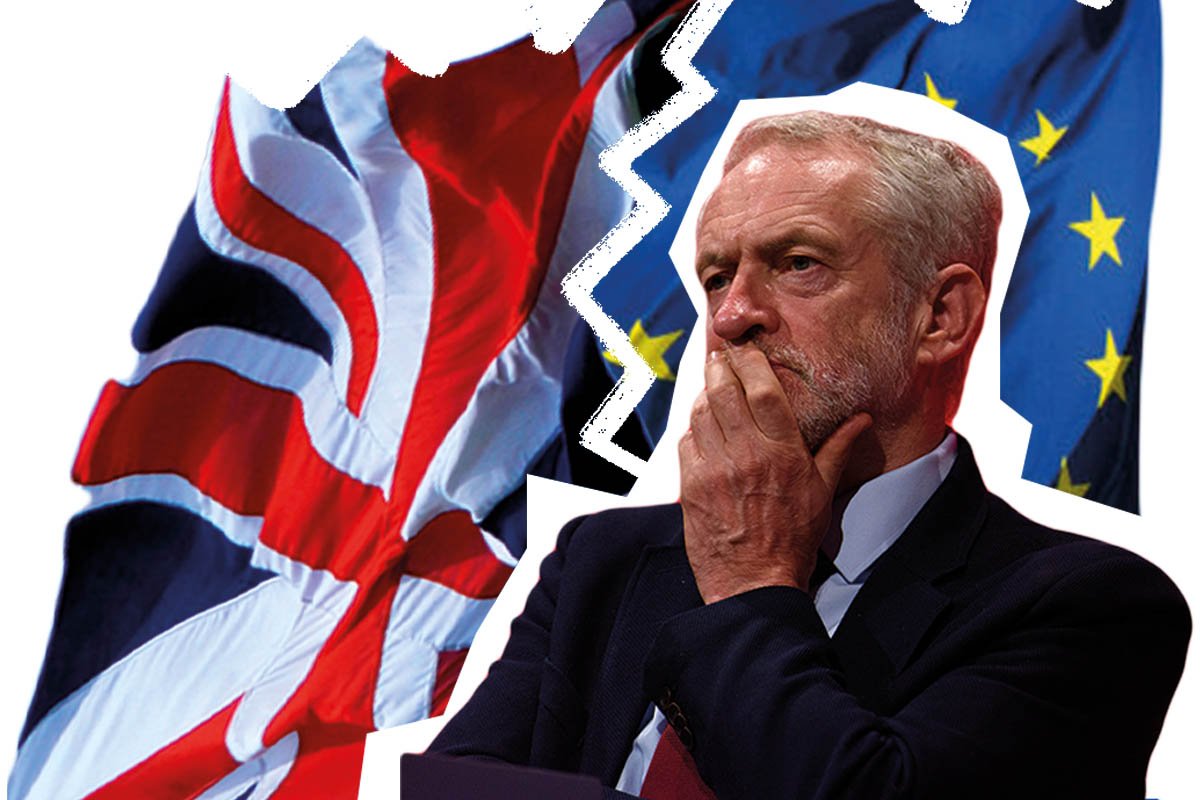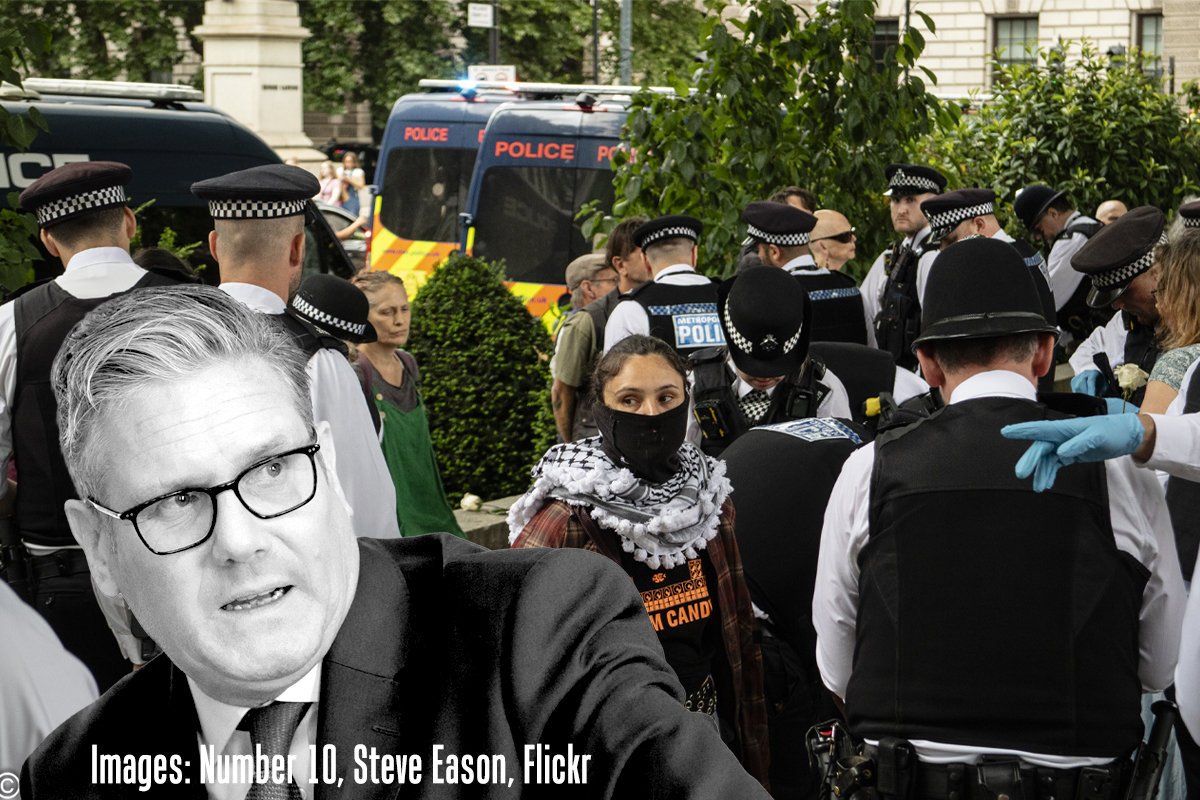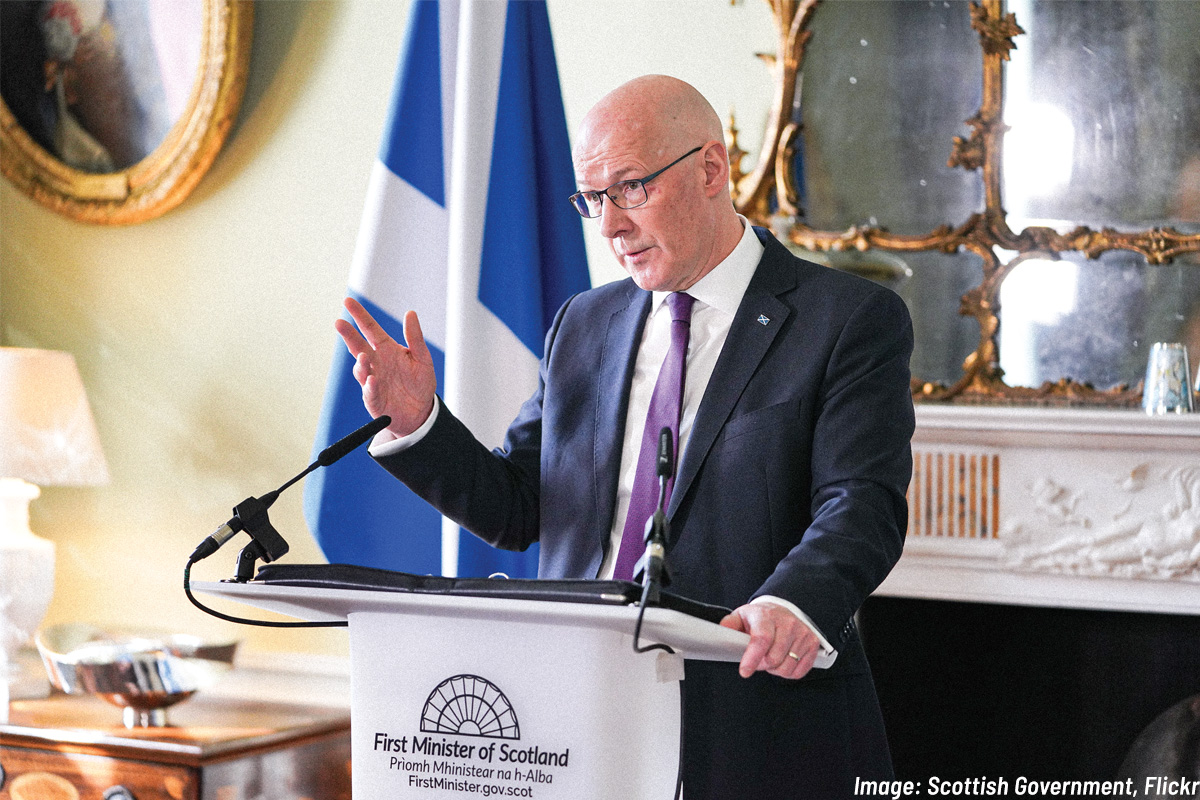The scale of Labour’s election defeat has prompted a debate over the future direction of the party. It is essential that we learn the lessons of this defeat – of which there are many.
Whilst the lower turnout and the hysterical smear campaign waged by the Tory Party and the media clearly damaged Labour’s prospects, the central issue of this election was Brexit. We must therefore examine the party’s position in relation to Brexit – how it evolved and why it failed – and also clarify what a clear, socialist position on the EU and Brexit should be.
Principled position
It is worth returning to first principles to understand the socialist position on the European Union. We are internationalists. We are for the greatest possible unity of the working class around the world, and ultimately for the abolition of all national borders.
This does not mean, however, that we support any and all international organisations. We do not support the British Commonwealth for instance, nor NATO and the United Nations, for all their claims about bringing nations together.
It is necessary to take a class approach. And what is the class nature of the EU? Stripping back all the empty talk of European peace and brotherhood, it has always been an alliance of the European monopolies directed against rival power blocs and their former colonial subjects around the world.
The best that could be said for this project was that it was an attempt to overcome the limitations of the nation state, which had long been a barrier for further economic and social development. But the necessity of this task should in no way oblige us to support the capitalists’ attempts to carry it out on their own terms.
The only way you can unify workers across borders in a genuinely democratic and progressive way is on the basis of a socialist transformation of society. This must begin not with the reform of the EU and its institutions, but with their destruction and replacement by a Socialist United States of Europe. And neither remaining in the EU nor leaving on a capitalist basis takes us one inch closer to this goal.
The referendum
 When David Cameron called the EU referendum, Labour right-wingers leapt to defend EU membership – not out of any socialist or internationalist principles, but in the interests of big business. Blairite grandee Alan Johnson even took the liberty of launching his ‘Labour In’ campaign before the party had even taken a position on the matter.
When David Cameron called the EU referendum, Labour right-wingers leapt to defend EU membership – not out of any socialist or internationalist principles, but in the interests of big business. Blairite grandee Alan Johnson even took the liberty of launching his ‘Labour In’ campaign before the party had even taken a position on the matter.
Unfortunately, a large number of trade union leaders followed the Blairites’ lead and advocated a vote to remain, claiming that it would “protect jobs and workers’ rights”. But the class nature of the EU had not changed one bit. By the time of the referendum, the European Commission, European Central Bank and the IMF had succeeded in erasing all collective bargaining rights for Greek workers, to name but one example.
In Britain, despite reams of European legislation designed to prevent a ‘race to the bottom’, workers have found themselves in a more precarious position than when Britain joined the EEC in the 1970s. Low-paid, zero-hours employment is rife, with no collective bargaining whatsoever. Without a powerful trade union movement and a fighting leadership, the protection of ephemeral legal rights has proved worse than useless.
Jeremy Corbyn, only recently elected leader of the Labour Party, came under intense pressure from the Labour right to advocate a full-throated defence of the EU. Seeking to maintain the unity of the party, Corbyn downplayed his own criticisms of the EU and effectively renounced his own left-wing opposition to it, calling on workers to vote to remain, but to then try to change it from the inside.
Although this presented a more sober picture of the EU than the paradise painted by the Blairites, it offered no explanation of how the EU and its institutions could in fact be reformed. In reality, it amounted to the utopian demand that the capitalist monopolies of Europe reform their own institutions in order to be more pro-worker.
If Corbyn and the Left had come out boldly against the EU – whilst defending workers’ rights and freedom of movement for all on a socialist basis – this would have transformed the situation. It could have shifted much of the debate away from immigration and onto the real nature of the EU – and to the question of how to improve society, particularly in the deindustrialised heartlands where Labour had lost support under Blair, Brown and Miliband.
In the event, Corbyn’s criticisms of the EU, scorned and silenced by the right wing of his own party, did not break through. As a result, much of the poorest and least organised sections of the working class, who were desperately looking for change, looked to the reactionary Leave campaign for an alternative. And the question of Brexit would continue to haunt Labour for years to come.
Referendum rejected
 Following the shock result of the 2016 referendum, Corbyn was rewarded for his concession to the Blairites with an attempt to depose him – carried out by the same people he had tried to placate.
Following the shock result of the 2016 referendum, Corbyn was rewarded for his concession to the Blairites with an attempt to depose him – carried out by the same people he had tried to placate.
Only a year after Corbyn’s election as party leader, the right wing of the party – and the PLP in particular – engineered a fresh leadership contest and even tried to prevent him from standing. After this failed, they eventually fielded their champion, Owen Smith, whose programme could be summed up in two points: 1) I agree with Jeremy’s policies but I would make a better leader (don’t laugh!); and 2) Labour should campaign for a new referendum on EU membership.
Of the roughly 500,000 members, affiliates and registered supporters who voted, fewer than 200,000, roughly 38%, supported Smith. On the other hand, Corbyn, who at that time rejected the demand for a second referendum, won decisively. This shows the real state of play within the party. The vast majority of members considered putting forward a radical left-wing programme whilst respecting the referendum result to be more important than fighting to stay in the EU.
The party’s Brexit position was then put to the test in 2017 when Theresa May launched her snap election, promising “a strong and stable government to get Brexit done”. The media was predicting a Tory landslide and the Blairites couldn’t contain their glee. Corbyn was finished – or so they thought.
In the end, rather than winning a three-digit majority, as had been so confidently predicted at the start of her campaign, May lost her majority altogether. But it is worth noting that May won over two million more votes than David Cameron in 2015, and increased the Tory vote in so-called Labour heartlands in the north by much more than Johnson in 2019. So how did she lose?
May lost her majority because the ‘unelectable’ Jeremy Corbyn increased Labour’s vote share by almost 10% – the most since 1945. This spectacular result was achieved on a platform of respecting the result of the 2016 referendum and therefore leaving the EU, whilst pursuing a programme of important left-wing reforms to improve living standards and shift power towards the working class.
The Tories were in complete disarray. Inside the Labour Party, the right wing, who had been confidently looking forward to Labour’s defeat, were demoralised and on the retreat. But rather than pressing the advantage, the party veered towards the idea of a ‘People’s Vote’. This proved to be a fatal error.
People’s Vote returns
 From the 2017 election onwards, there was a relentless campaign to shift Labour’s Brexit position by the party’s right wing, which still retained an important base of support in the PLP. Initially, the Blairites had limited their demands to permanent membership of the Single Market, echoed by disingenuous calls for “clarity” in the media.
From the 2017 election onwards, there was a relentless campaign to shift Labour’s Brexit position by the party’s right wing, which still retained an important base of support in the PLP. Initially, the Blairites had limited their demands to permanent membership of the Single Market, echoed by disingenuous calls for “clarity” in the media.
But the launch of the People’s Vote campaign in April 2018 marked a new stage in the fight to change the party’s position. Essentially an alliance of Labour right-wingers, Tories, Lib Dems and billionaires, the campaign’s only real purpose was to put pressure on Corbyn to support a second referendum.
In the months leading up to the 2018 Labour conference, spurious polls were regularly published by the pro-Remain press, claiming “widespread support for another referendum”, and that “more than 2.6 million people have abandoned their support for Brexit”. The fact that polls showed the most popular alternative to May’s Brexit deal was ‘no deal’ was routinely ignored.
An avalanche of opinion pieces and pamphlets descended, repeating the same tired arguments made during the referendum. Worst of all, a section of the Left took up the task of making the Blairites’ case for them, with “Hard left, hard Remain” campaigns such as Another Europe is Possible eulogising the EU as a “peace project” and extolling the “extraordinary possibilities open to a Corbyn government inside the EU”.
Supporters of the People’s Vote campaign put forward a motion to Labour conference. Supported by a thunderstorm of pro-Remain propaganda in the establishment press, the Blairites confidently expected the members to back their motion and deal an embarrassing blow to the party leadership.
Facing a possible defeat, the leadership fudged the issue, pulling together a composite motion that gave support for a second referendum if the party could not get a general election. The excuse for making this concession was that the majority of delegates would have supported a ‘People’s Vote’. But this again comes down to a question of leadership.
These were the same members who had campaigned passionately for the 2017 manifesto, which advocated leaving not only the EU but the Single Market as well. If the Labour leadership had set out a principled, socialist case for respecting the referendum result and transforming Europe on a class basis, then the majority of members – who were and are by no means hardcore Remainers – could well have backed it. Instead, it chose to retreat.
Further retreats
 Sensing weakness, the Blairites – aided by leading figures such as Tom Watson and Keir Starmer in the shadow cabinet – ramped up the pressure and the position adopted at conference was discarded within weeks.
Sensing weakness, the Blairites – aided by leading figures such as Tom Watson and Keir Starmer in the shadow cabinet – ramped up the pressure and the position adopted at conference was discarded within weeks.
On 28 November 2018, John McDonnell announced that Labour would “inevitably” back a second referendum as a general election looked “unlikely”. But there was no serious attempt made by the party leadership to mobilise a mass campaign to make an election a reality. Left-wing critics of the People’s Vote line, such as Ian Lavery and Richard Burgon, were sidelined in the party and more or less ignored in the media.
On 15 January, May’s Brexit deal suffered the biggest parliamentary defeat in British history, losing by 230 votes. The same day, Labour tabled a motion of no confidence in the government, which was rejected by 325 votes to 306. The party leadership immediately put the wheels in motion for a second referendum. And on 21 January, Labour put forward an amendment in parliament calling on MPs to consider such a vote.
It was argued that Labour had to back a second referendum in order to prevent a no-deal Brexit. This argument was seriously mistaken. As we would later learn, it turns out the capitalist class has plenty of tools at its disposal to stave off the threat of no deal, not least the Supreme Court. Labour had lost its way, seemingly prioritising defeating the spectre of no deal over kicking out the Tories.
The public commitment to a second referendum proved a turning point. In a poll carried out by Opinium between 30 January and 1 February, Labour’s support dropped by six points, while the Tories’ rose by four, as compared with 16-18 January. Labour had turned a three point lead into a six point deficit.
The party suffered another blow at the elections to the European Parliament on 23 May, in which only diehard Leavers or Remainers took part. On a pathetic turnout of 37%, the Brexit Party stormed to victory, winning 30.5% of the vote. The Lib Dems, fighting on a platform of fighting to remain in the EU, came in second, and Labour came in third with only 13.8%.
This produced outright panic in the Labour Party. The line, peddled by the Blairites and inexplicably swallowed by some on the Left, was that this result meant that Labour must do whatever it takes to win over Remainers who had voted Lib Dem. Paul Mason announced that “the only way forward was to oppose Brexit”, continuing his proud record of never having been right on anything in his entire career.
Owen Jones, who up to that point had been rightly sceptical of the party’s backing of a second referendum, capitulated. In his view, “relying on increasingly angry remainers to plump for Labour – regardless of what the alternative is – can no longer be depended on”.
The conclusion was therefore that the party had to win back these angry remainers with the promise of a second referendum, even though Jones himself had identified in the same article that had Labour adopted this position in 2017 the Tories would have won a huge majority.
What this shows is that in politics it is not sufficient to be right; it is necessary to have the courage to maintain the correct position in the face of vitriol and misinformation. The Labour Left found itself in the tragic position of knowingly supporting a disastrous position, because they had no faith that anything else was possible.
At the Labour conference in 2019, the party leadership faced yet another challenge from the right over Brexit, with the Blairites demanding that the party campaign for Remain in any event. Their motion was defeated convincingly. But it must be said that the leadership’s successful motion was itself a retreat from 2018, let alone the position in 2017.
Having committed to fighting for a Labour government to negotiate Brexit (with a second referendum as a backup option to prevent a no-deal Brexit), the leadership now found itself arguing for a Labour government in order to hold a second referendum. The only logical purpose of this would be to overturn Brexit altogether. The Blairites’ explicit endorsement of Remain may have been defeated, but the official party position came across as an implicit acceptance of the same position.
Despite winning every vote, the leadership had in effect lost the argument. This is the necessary consequence of constantly seeking compromise instead of clear political debate.
We are often told by self-proclaimed realists in the movement that we must ‘pick our battles’. But in politics, as in war, this rule only holds good in certain situations. If you constantly retreat before the enemy then you risk allowing yourself to be pushed onto less and less favourable terrain, creating an inexorable logic of defeat.
In reality there was never a real debate in the party on this question – only a noisy and well-funded propaganda campaign from big business and its representatives in the party. Meanwhile, there was little or no response from Corbyn, who was continually forced to keep silent due to fears of splits and divisions. We must recognise this as a mistake – one that cannot be repeated. We must be confident in our ideas and put them forward boldly.
Election defeat
 Brexit was always going to make life hard for the Labour Party. It has divided workers in Britain along completely reactionary lines. But this defeat was not inevitable. The election campaign saw thousands of activists take to the streets, inspired by the radical policies on offer in the manifesto. Many young people entered into political activity for the first time in order to get Corbyn into Number 10, while the majority of voters under 35 voted Labour.
Brexit was always going to make life hard for the Labour Party. It has divided workers in Britain along completely reactionary lines. But this defeat was not inevitable. The election campaign saw thousands of activists take to the streets, inspired by the radical policies on offer in the manifesto. Many young people entered into political activity for the first time in order to get Corbyn into Number 10, while the majority of voters under 35 voted Labour.
In many ways it was an inspiring campaign. But the strategy of trying to win over Remainers proved disastrous. In the event, many wealthy Remainers opted to vote Tory rather than see a ‘Marxist’ occupy Downing Street. Even George Osborne, who had spent over a year mobilising his Evening Standard readers behind a People’s Vote, advised them to vote for a hard Brexit under Johnson, rather than risk a Corbyn government. Class interest won out.
The party’s position was further undermined by the eagerness with which shadow cabinet members – including Emily Thornberry, Keir Starmer and even John McDonnell – announced that they would campaign for Remain in a second referendum. Corbyn, meanwhile, was left arguing that he would take a neutral position on his own deal. To all intents and purposes, Labour was a Remain Party – and suffered the consequences.
Labour saw its tally of seats in the House of Commons sink by 59, to its lowest level since 1935. As the results came in, the so-called ‘Red Wall’ of traditionally safe Labour seats in Wales, the Midlands and the north came tumbling down, as Leave-supporting former Labour voters turned to the Brexit Party, stayed home, or even voted Tory.
The Labour right wing has since sought to shift the blame from themselves onto Corbyn, claiming his unpopularity or even that his policies were the problem. This cannot be taken seriously. In a January 2019 poll of people who “had a favourable view of Jeremy Corbyn but no longer do”, YouGov reported that “Brexit indecisiveness is seriously damaging Corbyn”, with three quarters of responses relating to Brexit.
Corbyn’s perceived weakness stemmed directly from his position on Brexit. He was seen as weak because his policy was being set by his opponents; and insincere because it was suspected (not without reason) that he didn’t agree with it.
This defeat could have been avoided, but only by waging a relentless assault against Blairism: not only in the form of mandatory reselection, but also in a political campaign against the failed policy of constantly seeking to win over moderate Tories and the establishment press whilst ignoring the very people the party represents. Only on this basis can we win a socialist Labour government.
Battles ahead
 We must now look to the battles ahead. The perspective for the EU itself is one of crisis. Its break up is in no way ruled out. Recent inspiring movements in Catalonia and France clearly show that the workers of Europe all need the same thing: an international struggle, not to reform the EU, but for the socialist transformation of society, putting the working class in control at all levels, and finally unifying Europe on a genuine, working-class basis.
We must now look to the battles ahead. The perspective for the EU itself is one of crisis. Its break up is in no way ruled out. Recent inspiring movements in Catalonia and France clearly show that the workers of Europe all need the same thing: an international struggle, not to reform the EU, but for the socialist transformation of society, putting the working class in control at all levels, and finally unifying Europe on a genuine, working-class basis.
In Britain, a fresh crisis is imminent. All of the Tories’ promises will disappear as quickly as they were conjured up. Cuts, lay offs and further attacks on workers are firmly on the order of the day. The fightback will be immense. It will need leadership. This requires a Labour Party of dedicated representatives of the working class.
Any attempt to drag us further into the toxic mire of Blairism will end in disaster. Corbyn’s leadership has proven that left-wing policies can win wide support. It has brought a new generation of Labour activists to its feet. But it also shows the peril associated with seeking compromise and unity with an implacable opponent who is set on your destruction.
Our slogan must be: no more concessions to the Blairites; no more appeals to the fictitious centre ground. For a socialist Labour Party under the democratic control of its members and the working class – fighting for the victory of socialism in Britain, Europe and the world.






